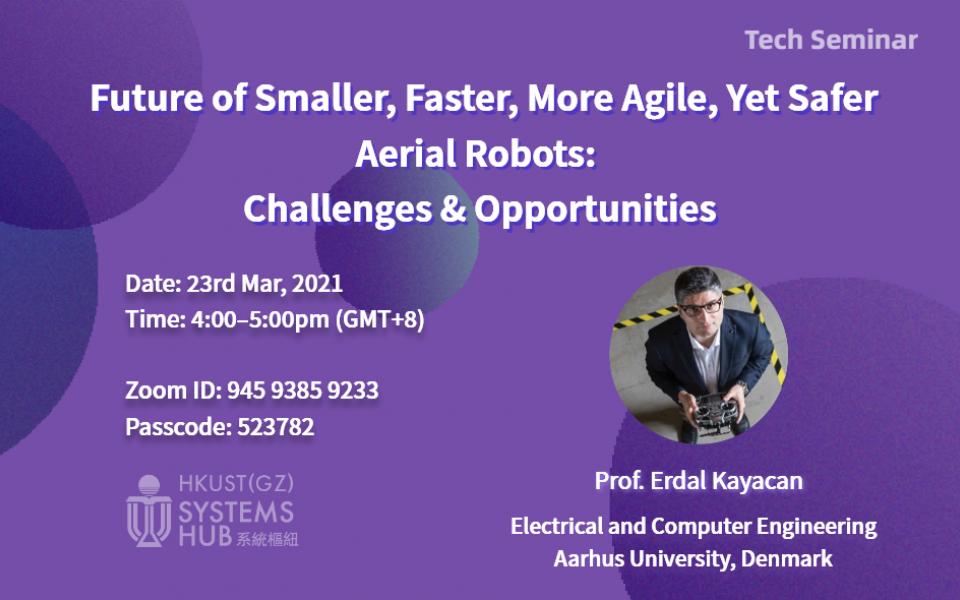Future of Smaller, Faster, More Agile, Yet Safer Aerial Robots: Challenges & Opportunities
ABSTRACT
Unmanned aerial vehicles have been explored for a wide variety of applications ranging from search and rescue, package delivery, traffic monitoring, and exploration tasks in an unknown environment. Request for increased, almost perfect, accuracy and efficiency of aerial robots pushes the operation to the boundaries of the performance envelope and, thus, induces a need for reliable operation at the very limits of attainable performance. Unfortunately, unmanned aerial vehicles are strongly coupled, inherently nonlinear systems that are open-loop unstable, which render their control a challenging problem. Besides these difficulties, there are operation and/or environment-specific challenges such as varying operational conditions that induce internal and external uncertainties in the system. All the aforementioned issues imply strong reasons to incorporate either sophisticated model-based controllers or simpler yet learning-based controllers that can learn the system dynamics throughout the operation. Therefore, this talk will focus both model-based and model-free learning methods to handle various real-time aerial robot control problems. Another challenge with unmanned aerial vehicles is that they must execute their missions as fast as possible with the most efficient machine learning algorithms for perception, planning, and control tasks due to the limited energy storage capacity and inefficiency of rechargeable batteries, drones. Motivated by the aforementioned need, agile aerial robots have gained increasing interest in the robotics community. As a benchmark problem for agile robotics, autonomous drone racing, which is one of the most challenging robotics problems, is an appropriate testbed for benchmarking efficiency of developed machine learning algorithms as well as their required sensors. Thus, this talk will also introduce deep learning methods for perception and planning of aerial robots as applied to autonomous drone racing problem. Last but not least, the talk will address the anomaly detection problem using drones. A deep autoencoder-based anomaly detection method for indoor surveillance will be introduced. Unlike similar studies, the presented approach is image-agnostic (i.e., it cannot see raw images) and accepts grid representations of scene images, which indicate spatial layouts of objects in a scene, as inputs. This approach allows us to isolate the anomaly detection problem from any vision-related issues, such as illumination variations.
BIOGRAPHY
Erdal Kayacan received a Ph.D. degree in electrical and electronic engineering at Bogazici University, Istanbul, Turkey in 2011. After finishing his post-doctoral research in University of Leuven (KU Leuven) in 2014, he worked in Nanyang Technological University (NTU), Singapore at the School of Mechanical and Aerospace Engineering as an assistant professor for four years. Currently, he is pursuing his research at Aarhus University at the Department of Electrical and Computer Engineering as an associate professor and he is the Director of Artificial Intelligence in Robotics laboratory (AiR Lab). He has since published more than 140 peer-refereed book chapters, journal and conference papers in model-based and model-free control, parameter and state estimation, artificial intelligence, computer vision, motion and path planning for robots. He has completed a number of research projects which have focused on the design and development of ground and aerial robotic systems, vision-based control techniques and artificial intelligence. He is currently involved in a number EU projects; some of which are “Reliable AI for Marine Robotics” by by Horizon 2020 - H2020-MSCA-ITN-2020, European Union and “Open Deep Learning toolkit for Robotics” by Robotics Core Technology ICT-10-2019-2020, European Union. Dr. Kayacan is co-writer of a course book “Fuzzy Neural Networks for Real Time Control Applications, 1st Edition Concepts, Modeling and Algorithms for Fast Learning”. He is a Senior Member of Institute of Electrical and Electronics Engineers (IEEE) and members of Computational Intelligence Society and Robotics and Automation Society. Since 1st Jan 2017, he is an Associate Editor of IEEE Transactions on Fuzzy Systems (TFS) and IEEE Transactions on Mechatronics (TMECH).
